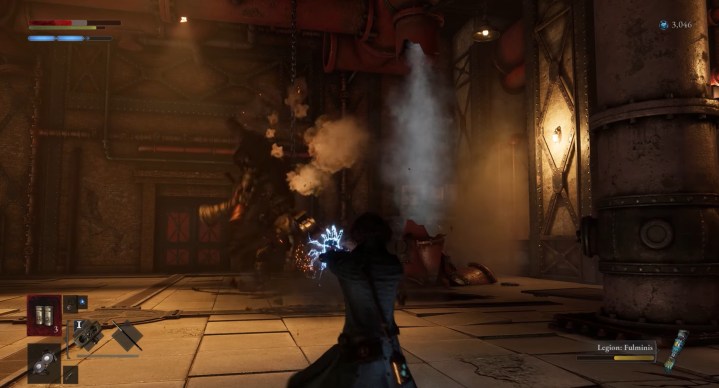If you know my tastes, you know that I have a love-hate relationship with the Soulslike genre. Well, more like a hate-hate relationship. Historically, I’ve never had the patience for critical darlings like FromSoftware’s Bloodborne that forced me to bang my head against hard bosses for hours on end. Elden Ring would alleviate a lot of my frustrations with the genre thanks to its open-ended structure, but it didn’t exactly have me rushing back to give Sekiro: Shadows Die Twice another chance.
So it comes as a personal surprise that I’m currently obsessed with Lies of P. At first, I was sure I wouldn’t click with a game that looked like a Bloodborne clone from an unproven developer; I was mostly just in it for its bizarre Pinnochio premise. The more I’ve played, though, the more I’ve become engrossed in the atmospheric action RPG. What once enraged me has finally become a motivator in my quest to kill a city full of twisted puppets.
The deeper I get, the more I’m starting to realize that my problem was never with the Soulslike genre: It’s strictly with FromSoftware.
New spark
My first introduction to the Soulslike genre was through developer FromSoftware — how could it not be? The studio is responsible for inventing a breed of action RPG that’s been copied into the ground since. Games like Dark Souls have earned their place on “all-time best game” lists thanks to their influence on the industry. Though I’ve always admired the studio for that reason, I’ve had a hard time fully clicking with its games.
FromSoftware is a powerhouse when it comes to atmosphere and art design, but it can be stubborn when it comes to gameplay. Anyone who’s played one of its games may be familiar with “FromSoftware jank.” That’s a catch-all term that can be used to describe a variety of quirks, from enemies attacking through walls to cameras getting stuck in massive bosses. Even a game as impressive as Elden Ring is full of moments like that, as the studio hasn’t done much to polish any of its rough edges since it began making Souls games.

For some players, that’s part of the charm. But not for me. When a game expects perfection from me, I expect it’s going to give me the tools to make that possible. Even in the best FromSoftware games, I still routinely hit scenarios where it feels like deaths aren’t entirely my fault. Elden Ring’s Fire Giant isn’t a hellish fight because of his flaming attacks; it’s because I struggle to keep the camera focused on him.
My experience with Lies of P has been very different so far. Five chapters in and I’ve yet to hit a moment where a death feels out of my control. That’s because developers Round8 Neowiz created an exceptionally well-polished game considering the studio’s size. Performance is silky smooth on my Xbox Series X with no stuttering so far. Any massive bosses I’ve encountered have been in wide open spaces that make them easy to keep in focus. My attacks always land exactly as I expect them to and I’m never surprised by a boss killing me through a pillar. (Some of these issues even bled into this year’s Armored Core VI: Fires of Rubicon, despite it being an entirely different style of game).
With a lot of friction out of the way, I’m more easily able to lose myself in the mysterious world. I feel myself moving around more boldly, as I’m not as afraid that a cheap death will rob me of my precious Ergo. Hard bosses no longer feel hopeless; I’m actually able to improve on each attempt instead of struggling to work around a left-field design quirk or looking for an easy exploit. Small quality-of-life considerations go a long way too. Being able to refill a healing flask by attacking enemies gives me a good reason to dive head-first into battles rather than run away.

That experience confirms something I started to feel when playing the PS5’s Demon’s Souls remake last year. While the original game was created by FromSoftware, developer Bluepoint handled the remake with a finesse that even Elden Ring lacks. It would quickly become my favorite Soulslike in large part due to its incredible polish and smooth gameplay. I wouldn’t just beat it; I’d downright master it, vanquishing some major bosses on my first try thanks to how much control I had over it. It’s a perfect scenario: It gets to keep the striking art design that FromSoftware excels at while letting an outside developer tackle the genre’s quirks with a pair of fresh eyes. Lies of P pulls off that same trick and it’s working for me so far.
Granted, Lies of P isn’t without its own rookie mistakes that a company as skilled as FromSoftware wouldn’t dare make today. Long animations and a lack of cancellation can lead to aggravation. My more frustrating deaths came after getting knocked down and locked in a deadly attack pattern before I could get up. Plus, all of its strengths merely riff on FromSoftware’s ideas rather than presenting its own innovations. It isn’t going to break any ground, while FromSoftware’s games continue to lead the charge.
Even so, I hope that Lies of P’s success breeds some healthy competition. The gaming industry is at its best when developers are in conversation with one another. If the end result of a Pinocchio Soulslike is that it pushes FromSoftware to add even the slightest quality-of-life improvements to its games, that’ll be enough of a win for me.
Lies of P is available now on PS4, PS5, Xbox One, Xbox Series X/S, and PC.



